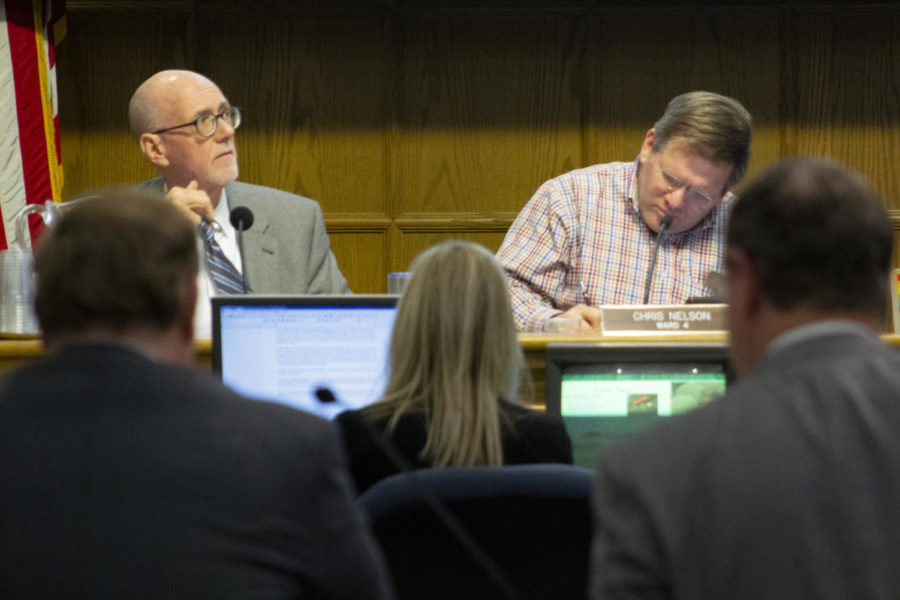City council talks budget over course of three days
February 8, 2019
The Ames City Council met three times throughout the week to listen to a multitude of city departments detail a proposed budget for fiscal year 2019-20.
Estimated expenditures total at $250,374,227, but are subject to change in the future.
The council will hear public input on the proposed budget at their Feb. 12 meeting and will move to finalize the budget in May.
The 2019-20 budget allocates federal, state and local funds to all city utilities, programs and departments. This includes utility maintenance, power production, affordable housing funding, fire and police departments and every other city program.
Iowa State University contributes to some of these programs, like the Ames Fire Department. Iowa State provides 25 percent of the fire department’s operational funding, which is estimated to be just over $1.69 million.
Ames fire and police departments may see a 3.9 percent increase in funding. The fire department is estimating $7,565,200 and the police are expecting to need $10,218,431. Iowa State doesn’t contribute to Ames Police because they have their own police force.
Ames Fire Department is also looking for new staff after their current staff experienced promotions. They need a new fire chief and two new deputy fire chiefs. They’re also working with Public Works to create a training site out of low cost, portable shipping containers.
Ames Police Chief Charles Cychosz announced the department will be enlisting an additional student resource officer for Ames Community School district. He said the current student resource officer focuses more on the high school and middle school but was getting increasing calls to help diffuse situations at the elementary school.
“Hazards associated with schools have increased,” Cychosz said. “[There are] more serious assaults, drugs and alcohol and weapons in schools.”
Fuel and purchased power for the city is estimated to cost $34,657,558, a 7.1 percent increase from last year. These expenditures include natural gas, refuse-derived fuel (RDF) and electrical energy purchased for nearby communities. Domestic power production is estimated to cost $12,044,282 a 1.1 percent decrease from last year.
Ames is seeing huge increases in community housing funds, largely due to federal funding through the Home Investment Partnerships Program.
City Housing Coordinator Vanessa Baker-Latimer detailed how the city could spend the estimated $601,264 the grant offers.
Seventy-five percent of the Home funds would go directly to housing programs, 10 percent will go to administrative costs and the remaining 15 percent must fund a community housing development organization (CHDO).
“We currently don’t have any eligible CHDOs in our community,” Baker-Latimer said. “If we don’t create one, those funds stay at housing and urban development, and we can’t spend them.”
The program also requires a 25 percent local match from city funding, and the city has already reserved $250,000 in General Obligations Bonds to fund the local match. Excess money will go to fund the local match for the next allocation of funding.
There is also three potential annexations for land surrounding the city. If approved, they would add more than 500 acres of land to the city.
CyRide is increasing its funding in certain aspects to keep buses out longer. The 6 Brown South will run from 8:30 a.m. until 10:30 p.m. on weekdays. The 11 Cherry will operate from 6:30 a.m. to 8:30 a.m., and the 25 Gold will run from 10:30 a.m. until 12:30 a.m.
The total projected budget for public transit is $2,212,819. The program is seeing $250,000 in federal funds, a 12.5 percent increase from last year. It is estimated to cost $200,000 to keep the buses out for longer.
The city is reserving $1.2 million for smart technology, which gives out rebates to people who invest in more energy efficient technologies. The city rewards people for using personal solar panels, energy-saving air conditioners and other similar technologies.
The City Human Resources Department has accepted more than 2,000 applications for 64 available positions for city staff, and it’s also assembling a new Diversity and Inclusion Team.
“It’s a really exciting step forward to increase our capacity as an organization and to have an inclusive environment here where people will want to come and have the growth opportunities everyone deserves,” Bob Kindred, assistant city manager, said.
Parks and Recreation is looking to add $126,000 to its budget to compensate wage increases for it’s temporary staff. To do so, they’re increasing daily admissions to Furman Aquatic Center by 50 cents, eliminating toddler passes and increasing the cost of aquatic center passes by 3 percent.
















